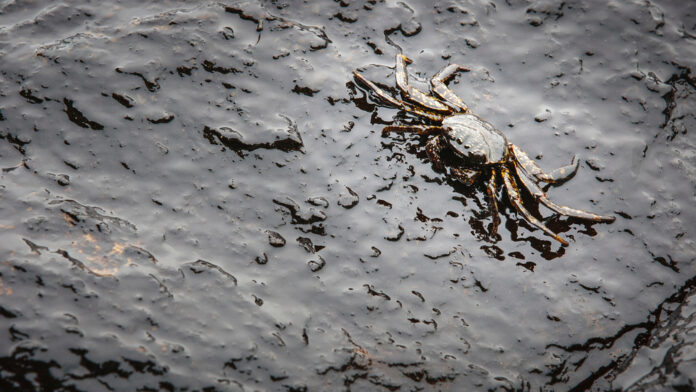The global environment activist, Oceana, calls on the government quickly to stop further damage on the marine environment, fisheries resources and livelihoods in the wake of the sinking of an oil tanker in Mindoro last week.
Gloria Estenzo Ramos, Oceana vice president, said the oil spill can coat marine habitats and animals, clog the gills of fish and marine invertebrates and damage the feathers of birds and fur of marine mammals.
Ramos reiterated the toxic materials can be harmful even to humans if they consume the contaminated seafood.
Oceana said aquatic pollution is punishable under various laws, including the Fisheries Code, Clean Water Act and the Oil Pollution Law that mandates those responsible for the pollution to pay for the damage and rehabilitation of affected resources.
“The involved agencies, including the Department of Environment and Natural Resources (DENR) and Bureau of Fisheries and Aquatic Resources and local government units, should immediately convene for the much-needed emergency response to contain the spread of the pollution and look into affected communities. We also call for the immediate investigation of this incident and responsible government agencies like the Philippine Coast Guard (PCG) and the Maritime Industry Authority must ensure strict measures are in place so that ships are not allowed to travel if they are not seaworthy anymore,” Ramos added.
Oceana said that based on reports, engine trouble is the proximate cause of the sinking and subsequent oil spill. Questions arise as to why the boat was allowed to leave port if its seaworthiness was not thoroughly ascertained.
Ramos pointed out the local government may file criminal and civil cases against the vessel owner for punitive fines ranging from P600,000 to P1 million and imprisonment of up to 12 years.
Oceana also said the liability for oil pollution damage is also spelled out in the Oil Pollution Law as a ship owner is liable for damages, which shall include, but not limited to expenses incurred in clean-up operations at sea or on shore; consequential loss or loss of earnings suffered by owners or users of property contaminated or damaged as a direct result of an incident; pure economic loss or loss of earnings sustained by persons; damage to human health or loss of life, including expenses for rehabilitation and recuperation; environmental damages and other reasonable measures of restoration.
An ongoing disaster forensics is conducted by the DENR and the University of the Philippines-Marine Science Institute (UP-MSI) to protect the mangroves, seagrass and over 36,000 hectares of coral reefs in Bulalacao, Oriental Mindoro and Caluya, Antique that can be potentially affected by the oil slick.
The National Mapping and Resource Information Authority is using a multibeam survey to locate the sunken MT Princess Empress owned by RDC Reield Marine Services Inc.
Talks to finalize arrangements on the augmentation of a cash-for-work scheme for the clean-up teams in local communities are in progress as well.
DENR’s Environmental Management Bureau in Mimaropa also continues its cleanup operations using locally available oil-absorbent materials and provisional spill booms made of cogon and sawali to prevent the oil spill from reaching the beach and mangrove areas of Pola, Oriental Mindoro.
DENR added it is also coordinating with Semirara Mining and Power Corp. to help in the cleanup operations in Caluya, Antique.
Petron Corp. said the MT Princess Empress was neither carrying products from its Bataan refinery nor own the fuel oil cargo tanker although it has tapped the Waterborne Industry Oil Spill Equipment Philippines to deploy oil spill equipment.
Petron Bataan refinery and Petron Mabini terminal have also extended assistance to the oil spill response teams by making available its own oil spill teams and equipment.
Petron’s refinery and operations personnel are adequately trained in operational safety, disaster preparedness and emergency response, including handling oil spills, Petron said.







